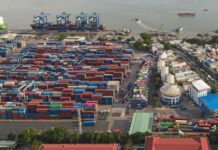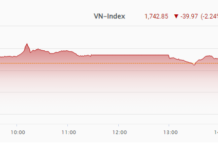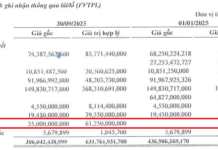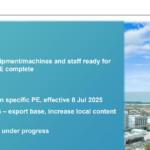
|
The digital landscape is booming, e-commerce is thriving, and artificial intelligence and blockchain technology are creating countless new opportunities.
|
On July 22, Prime Minister Pham Minh Chinh chaired a meeting to discuss the proposal for building a startup nation, which is to be submitted to the competent authorities for issuance.
Why Vietnam Needs to Become a Startup Nation
Over the past decades, Vietnam has achieved remarkable socio-economic development, with rapid growth, strong integration, and continuous improvement in people’s lives.
However, the growth model relying on resource exploitation, cheap labor, and public investment is revealing its limitations. Labor productivity remains low, international competition is fierce, and the pressure to overcome the “middle-income trap” and an aging population demands a new impetus – and that impetus is the wave of startups. That is the truth we must face…
In this context, Vietnam possesses a rare “timely” factor: a young, dynamic, tech-savvy, and integration-ready population. The digital landscape is booming, e-commerce is thriving, and artificial intelligence and blockchain technology are creating countless new opportunities. If harnessed and guided in the right direction, Vietnam’s young generation can become the central driving force of a strategic breakthrough – where startups not only create economic value but also symbolize national pride.
Therefore, at many major forums, Vietnam’s high-ranking leaders have demonstrated a strong vision for this mission. Prime Minister Pham Minh Chinh once emphasized: “Startup, innovation, and creativity are a driving force and an important resource in the development of every nation”, and required to “create an unlimited startup-innovation-digital transformation movement under the leadership of the Party and the engagement of the whole society”.

General Secretary To Lam spoke at the National Forum on Digital Technology Enterprises: “We are entering an era of national advancement, in which science, technology, and innovation will be the inevitable choice.” |
Startup Nation – A Definition Leading to Action
The concept of a startup nation is not merely understood as a country with many startups in operation. It is a new national development model where startups are no longer an individual choice but become a strategic driving force for the economy and society.
A startup nation is where:
1. Every citizen has the opportunity, belief, and tools to embark on their entrepreneurial journey, regardless of their background, education, or geographical location.
2. The state creates a harmonious ecosystem – including flexible institutions, liberating education, venture capital, and modern technological infrastructure – to maximize support for the formation, development, and expansion of new businesses.
3. A culture of entrepreneurship permeates society: where creativity is encouraged, diversity is respected, risks are accepted, and failure is seen as an essential part of the journey to success.
Above all, a startup nation is where a small idea from an ordinary individual can grow into a global business, empowered by a fair legal system, a friendly administrative institution, a supportive community, and societal belief in human potential.
As General Secretary To Lam stated at the National Forum on Digital Technology Enterprises: “We are entering an era of national advancement, in which science, technology, and innovation will be the inevitable choice.” This message is the clearest affirmation of the startup nation model.
A startup nation is a form of development where belief in human potential replaces reliance on resources, creativity replaces imitation, and a spirit of initiative replaces complacency. It is a guiding principle for nations aspiring to rise through their own strength. Vietnam can become such a nation – if we dare to believe, empower, and act.
 On July 22, Prime Minister Pham Minh Chinh chaired a meeting to discuss the proposal for building a startup nation – Photo: VGP/Nhat Bac |
Entrepreneurship Must Become a National Value and Strength
In our nation’s history, the spirit of entrepreneurship has never been lacking. From farmers improving their plows to traders crossing borders, from young people establishing themselves in remote areas to intellectuals inventing new products – all are seeds of the startup nation. But now, Vietnam needs to elevate this spirit from an individual to a national strategic level.
We need to foster entrepreneurship as a new cultural value – where young people dare to think big, dare to be different, dare to pursue their passions, and create sustainable value. Just as South Korea turned the dream of industrialization into a national mission, Vietnam can make entrepreneurship the “Vietnamese Dream” of the 21st century – a dream of creativity, freedom, and pride.
Entrepreneurship cannot become a pillar of development if it remains a movement or a few individual examples. For entrepreneurship to truly become a national strength, Vietnam needs to implement profound and systematic transformations – starting with institutions and education, the fundamental pillars of all significant transformations.
First and foremost, institutions need to be reformed vigorously to unleash creative potential and remove bottlenecks hindering the entrepreneurial spirit. No startup can thrive if suffocated by cumbersome administrative procedures, opaque laws, or invisible barriers in market access and resource acquisition. Ideas can only flourish when planted in a soil of freedom and fairness and nurtured by a legal system that encourages initiative.
Therefore, the state needs to proactively act as an “institutional midwife” through practical actions: thoroughly reforming procedures related to business establishment, operation, and dissolution; enacting a Law on Startup and Innovation with regulations protecting intellectual property rights and supporting sandbox models for new technologies; and establishing a system of tax, credit, and financial incentives exclusively for startups, especially in high-tech, digital transformation, and social innovation fields.
Parallel to institutional reform, education needs to be reshaped to sow the seeds of entrepreneurship from an early age. No one is born an entrepreneur. Entrepreneurship, at its core, is the result of a process of fostering resilience, nurturing a spirit of initiative, and training problem-solving skills – all of which can be learned if education knows how to inspire and unlock individual potential.
This demands a profound transformation from knowledge-imparting education to holistic education. Schools must be places that cultivate creative, critical thinking, teamwork, and learning through practical experience. Curricula should be closely linked to businesses, allowing students not only to acquire knowledge but also to experiment with ideas, build business models, and familiarize themselves with the market. Entrepreneurship clubs, innovation competitions, and practical projects… should be promoted and supported as part of comprehensive personal development.
An educational system that sows the seeds of entrepreneurship early on will create a generation of entrepreneurial citizens – those who not only seek jobs but create them; not just adapt but lead change. This will be the sustainable driving force for a nation aspiring to rise through its own strength.

Proposed pilot of “startup special zones” in Ho Chi Minh City, Hanoi, Hai Phong, and Da Nang
|
Some Breakthrough Solutions
In reality, the Party and the State have been implementing a series of breakthrough policies and strategies to unleash resources and boost startup and innovation activities. Notably, the four “pillar” resolutions of the Politburo are of particular importance: resolutions on science and technology, innovation and creativity, and digital transformation; on law building and enforcement; on private economic development; and on international integration. Other resolutions on education, healthcare, culture, and state economic development also hold similar breakthrough and strategic significance.
To materialize the aspiration of becoming a startup nation, Vietnam needs to accelerate the transformation from awareness to action and from orientation to concrete policy creation.
Accordingly, it is proposed that relevant agencies consider issuing a National Strategy on Startups towards 2035. This strategy should establish a clear vision, goals, and implementation roadmap – covering the quantity and quality of startups, innovation indices, ecosystem development, and entrepreneurial human resources. The strategy should not only provide direction but also serve as a high-level political commitment to making innovation the driving force for growth in the new era.
Along with this, establish a National Investment Fund for Startups based on a public-private partnership model. Startups cannot thrive without seed capital, while domestic venture capital funds are still limited. The state needs to proactively contribute to market creation by co-investing with businesses, supporting angel investors, and providing credit guarantees for innovative models. The fund will not only provide financial resources but also send a strong signal of the state’s accompaniment and trust.
Another possible breakthrough solution is to pilot “startup special zones” in Ho Chi Minh City, Hanoi, Hai Phong, and Da Nang. These will be “institutional laboratories” pioneering flexible and robust testing of preferential policies on taxes, administrative procedures, technology sandboxes, and investment connections. The special zones will not only create a conducive environment for startup development but also serve as a model for replication nationwide.
Additionally, connect the global network of Vietnamese startups. Vietnam should proactively mobilize the intelligence and resources of overseas Vietnamese intellectuals and technology entrepreneurs, while learning from successful models of leading startup ecosystems like Israel, Singapore, South Korea, or Estonia. This will create a cross-border innovation network where Vietnamese people, regardless of their location, can startup for Vietnam.
We have often spoken of Vietnam’s aspiration to become a developed, high-income country by 2045. In the century of intelligence and creativity, entrepreneurship is not just a slogan – it is the most practical path to unleashing national potential. Let’s transform Vietnam into a nation that dares to believe, invest, and provide opportunities for its young generation. For in every Vietnamese startup dream lies the dream of a nation’s advancement.
Dr. Nguyen Si Dung
– 06:58 01/08/2025
“Agris Bolsters Leadership, Geared for the 2025 – 2030 Breakthrough”
On August 1st, 2025, in Ho Chi Minh City, AgriS (HOSE: SBT) – a vanguard group in innovation and sustainable development – appointed several senior personnel, fortifying and completing their existing leadership team as they gear up for their strategic acceleration phase from 2025 to 2030.
Smart Warehouse Automation: Vinatech Group’s Auto Shelf Leaves a Mark at VILOG 2025
At VILOG 2025, Vietnam’s premier logistics expo, Vinatech Group’s automated storage solutions took center stage. Their innovative products, showcased through interactive demonstrations, offered businesses a glimpse into the future of warehouse management. With a focus on practicality and efficiency, Vinatech Group’s exhibits attracted a multitude of intrigued visitors, highlighting the very real and pressing need for effective storage solutions in the logistics industry.
The Billionaire’s Bet: Unveiling the $5.4 Billion Petrochemical Complex Revival in Ho Chi Minh City
SCG, a prominent Thai industrial conglomerate, boasts an extensive presence in Vietnam with 27 subsidiary companies, 15,500 employees, and over $7 billion in investments.












































